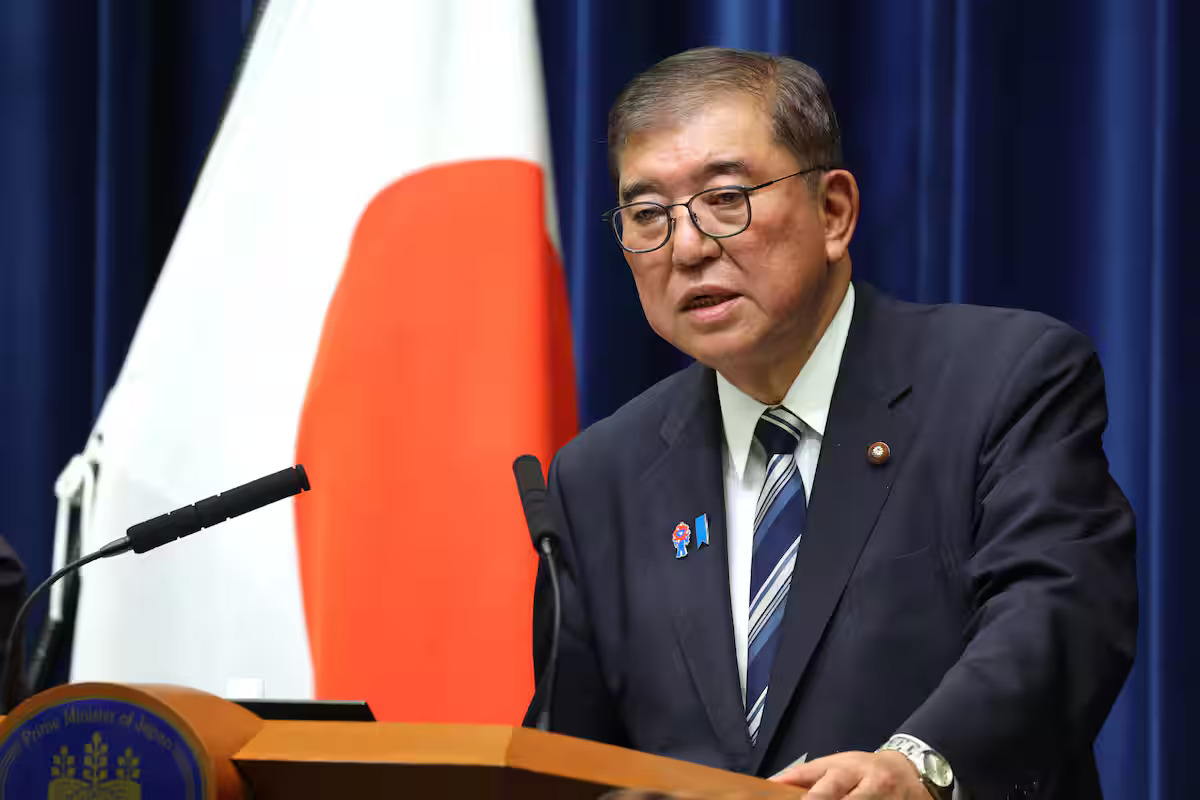Japan’s political landscape has entered a period of uncertainty after veteran politician Shigeru Ishiba, a prominent figure in the ruling Liberal Democratic Party (LDP), announced his resignation from leadership. Ishiba, long seen as both a reformist and a seasoned policymaker, has played a critical role in shaping debates over Japan’s defense, economic strategy, and democratic reforms. His departure marks a turning point that leaves Japan’s political future clouded, raising questions about who will lead the nation forward and how it will navigate pressing domestic and international challenges.
- Who is Shigeru Ishiba and Why His Leadership Mattered
- The Reasons Behind His Resignation
- The Impact on the Liberal Democratic Party
- Japan’s Domestic Challenges Without Ishiba’s Leadership
- Foreign Policy and Regional Security Implications
- The Global Reaction to Ishiba’s Resignation
- The Road Ahead: Possible Successors and Scenarios
- FAQs
- Who is Shigeru Ishiba?
- Why did Shigeru Ishiba resign?
- How does Ishiba’s resignation affect Japan’s politics?
- What challenges does Japan face after Ishiba’s exit?
- Who could succeed Ishiba as Japan’s leader?
- Conclusion
The resignation comes at a delicate moment. Japan faces sluggish economic recovery, demographic decline, regional security concerns amid China’s assertiveness and North Korea’s unpredictability, as well as shifting alliances with the United States. For decades, Ishiba represented stability, pragmatic policymaking, and a moderate voice within the LDP. His decision to step aside not only leaves a leadership vacuum but also exposes the cracks within Japan’s ruling establishment.
This article takes a deep dive into Ishiba’s legacy, the circumstances surrounding his departure, and the potential trajectories Japan’s political future might take as competing forces vie for control.
Who is Shigeru Ishiba and Why His Leadership Mattered
Shigeru Ishiba’s career in Japanese politics spans over four decades. Born in 1957, he rose through the ranks of the LDP and earned a reputation as a defense policy expert, often emphasizing Japan’s need for realistic security strategies in the face of evolving threats. He previously served as Defense Minister and held key positions in government, including ministerial roles in agriculture and regional revitalization.
Unlike many LDP politicians who built their careers on factional loyalty, Ishiba cultivated an image as an independent thinker who prioritized policy substance over party politics. His speeches often focused on Japan’s constitutional challenges, especially Article 9, which renounces war as a sovereign right. While not pushing for full militarization, Ishiba consistently argued for strengthening Japan’s Self-Defense Forces (SDF) to prepare for a more turbulent regional environment.
For the Japanese public, Ishiba represented a rare blend of intellectual rigor and populist accessibility. His popularity often rivaled or even exceeded that of prime ministers, though factional dynamics within the LDP frequently blocked his ascent to the country’s top office.
The Reasons Behind His Resignation
Ishiba’s resignation did not come out of nowhere. Analysts point to multiple factors that pushed him toward stepping down.
First, the LDP’s internal divisions have grown sharper in recent years. Younger politicians within the party are eager to move beyond veteran figures and present a new image to the public. Ishiba’s moderate stance and lack of strong factional backing weakened his leverage in party leadership battles.
Second, Japan’s electorate has become increasingly disillusioned with political gridlock. Public opinion surveys reveal declining trust in political institutions, with approval ratings for the LDP slipping after a series of scandals and policy missteps. Ishiba, despite his personal reputation, struggled to convince party elites that he could deliver electoral victories in future national contests.
Finally, Ishiba himself cited a need for generational change. In his farewell remarks, he emphasized the importance of allowing younger leaders to step into the spotlight, acknowledging that Japan’s challenges required fresh perspectives.
The Impact on the Liberal Democratic Party
The LDP, Japan’s dominant political force since the 1950s, is now at a crossroads. Ishiba’s resignation intensifies factional struggles and raises uncertainty over who will unify the party. While the LDP still holds a majority in parliament, its internal cohesion is under strain.
Without Ishiba’s balancing influence, hardliners within the party may gain more sway, potentially shifting Japan’s domestic and foreign policy agendas. For instance, debates over constitutional reform and military expansion could accelerate, driven by growing concerns over regional security. However, such moves risk alienating moderate voters who prefer Japan’s pacifist traditions.
At the same time, the opposition parties see Ishiba’s exit as an opportunity. The Constitutional Democratic Party of Japan (CDP) and other opposition groups hope to capitalize on the public’s dissatisfaction with LDP politics, though they face their own challenges of fragmentation and limited resources.
Japan’s Domestic Challenges Without Ishiba’s Leadership
Domestically, Japan faces a host of structural challenges that Ishiba often addressed with candor. His absence may leave these issues with less championing at the top levels of government.
- Demographic Decline: Japan’s population is shrinking and aging faster than most developed nations. Ishiba supported policies encouraging regional revitalization, immigration reform, and stronger support for families. Without his advocacy, these issues may slip down the political agenda.
- Economic Stagnation: Despite being the world’s third-largest economy, Japan struggles with slow growth, high public debt, and dependence on exports. Ishiba consistently emphasized balanced growth and revitalizing rural economies, contrasting with the LDP’s urban-centric policies.
- Public Trust in Politics: Scandals within the LDP, ranging from financial misconduct to cronyism, have eroded public trust. Ishiba’s image as a reformer offered some reassurance. Now, citizens may feel even more alienated from politics.
Foreign Policy and Regional Security Implications
One of the biggest concerns following Ishiba’s resignation is Japan’s foreign policy direction.
- China: With Beijing growing more assertive in the East and South China Seas, Ishiba pushed for a cautious but firm approach. He supported bolstering Japan’s defense capabilities while maintaining dialogue with China to avoid escalation. Hardliners in the LDP may adopt a more confrontational posture.
- North Korea: Ishiba’s deep expertise in defense made him a key voice on North Korea’s nuclear and missile programs. His absence could leave Japan without a strong advocate for carefully calibrated deterrence strategies.
- United States Alliance: The U.S.-Japan security alliance remains the bedrock of Tokyo’s defense posture. Ishiba supported closer cooperation with Washington but insisted on Japan developing greater self-reliance. This nuanced stance may now be replaced by either unquestioning alignment or increased nationalist rhetoric, depending on who succeeds him.
- Regional Leadership: Ishiba often spoke about Japan’s role as a stabilizing power in Asia. His departure raises concerns about whether Japan will retreat into insular politics or assert itself more aggressively on the international stage.
The Global Reaction to Ishiba’s Resignation
International observers have expressed concern over the uncertainty Ishiba’s resignation introduces. Analysts in Washington, Brussels, and Beijing are watching closely to see how Japan’s policies may shift.
A U.S.-based Asia security analyst remarked, “Shigeru Ishiba was a steady hand in turbulent times. His departure leaves a gap in Japan’s leadership at a moment when regional tensions are at a boiling point.”
China’s state media has already speculated that Ishiba’s resignation could lead to more hawkish leadership within the LDP, potentially heightening bilateral tensions. Meanwhile, European allies view the development as another sign of instability in a region critical to global trade.
The Road Ahead: Possible Successors and Scenarios
The future of Japan’s politics will depend on who emerges as Ishiba’s successor within the LDP. Several names are being floated, including younger reform-minded politicians who want to modernize the party’s image, as well as established figures with strong factional support.
There are three possible scenarios:
- Reformist Renewal: A younger leader could push for reforms that address Japan’s demographic crisis, expand digital innovation, and rebuild trust with the public.
- Conservative Consolidation: Hardline factions could dominate, emphasizing military expansion, constitutional revision, and closer alignment with nationalist rhetoric.
- Fragmentation and Drift: Without strong leadership, the LDP could face internal gridlock, leading to weak governance and opportunities for the opposition to gain ground.
FAQs
Who is Shigeru Ishiba?
Shigeru Ishiba is a veteran Japanese politician, former Defense Minister, and long-time member of the Liberal Democratic Party, known for his expertise in defense and reformist ideas.
Why did Shigeru Ishiba resign?
Ishiba resigned due to internal party divisions, waning factional support, public dissatisfaction with the LDP, and his desire for generational change in leadership.
How does Ishiba’s resignation affect Japan’s politics?
His departure leaves a leadership vacuum in the ruling LDP, raising uncertainty about Japan’s domestic reforms, economic recovery, and foreign policy direction.
What challenges does Japan face after Ishiba’s exit?
Japan must confront demographic decline, economic stagnation, declining public trust in politics, and increasing regional security threats without Ishiba’s guiding influence.
Who could succeed Ishiba as Japan’s leader?
Potential successors include younger reformist politicians and hardline LDP figures. The choice will determine whether Japan pursues reform, conservatism, or risks political stagnation.
Conclusion
Shigeru Ishiba’s resignation marks the end of an era in Japanese politics. His steady presence, reformist instincts, and expertise in defense policy provided a sense of balance amid turbulence. Without him, Japan faces a future clouded by uncertainty, with the potential for both renewal and regression.
The choices made by the LDP in the coming months will shape not only Japan’s domestic trajectory but also its role in the Asia-Pacific and the world. At a time of shifting alliances, rising global tensions, and deep domestic challenges, Japan urgently needs visionary leadership. Whether the nation can rise to meet that challenge remains to be seen.












